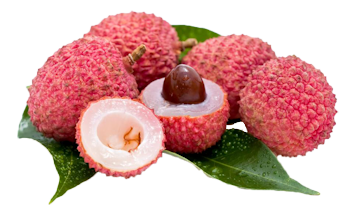|
Lychee, which has the scientific name Litchi
chinensis is in the soapberry family, but is the only member of its genus,
meaning that it is quite unique in the world. It is a fruit tree that can grow
in tropical and subtropical climates, and is native to China. It smells very
much like a flower, and is often used to flavour cocktails and dishes because
of its unique scent, which is lost if not consumed fresh. The fruit is almost
primarily eaten as a dessert food in Asian nations, but it has begun to make
the leap into more western markets, especially in luxury or high-end
restaurants.
The fruit has been cultivated for more than
4,000 years in China, and was once considered a great delicacy of the Imperial
Court. It is now cultivated in many nations around the world, but the main
production still resides in Southeast Asia, China, India, and parts of Southern
Africa.
Lychee is soft and pulpy, white or pink in colour,
and the size is usually about 2 inches high and 2 inches wide. They are highly
celebrated in countries around the world because of their health and medicinal
benefits, which are due to the wealth of nutrients and organic compounds
present in this fascinating fruit. However, far more nutrients are present in
dried lychee than in fresh lychee, so if you want to consume this for your
overall health, forgo the sweet smell and allow the fruit to dry. Most vitamin
and mineral contents more than double when eaten as a dried fruit.
|
|
Nutritional Value of Lychee
Lychee is packed with health benefits, but
they come from the vitamins, minerals, and nutrients in the fruit, including
vitamin C, vitamin B6, niacin, riboflavin, folate, copper, potassium,
phosphorous, magnesium, and manganese. Furthermore, lychee is a great source of
dietary fibre, protein, and a good source of proanthocyanidins and polyphenolic
compounds.
Lychee is a strange and wonderful fruit with
a wealth of health benefits, including its ability to boost the immune system,
prevent cancer, improve digestion, build strong bones, lower blood pressure,
defend the body against viruses, improve circulation, aid in weight loss, protect
the skin, and optimize metabolic activities.
Digestion:
The significant amount of dietary fibre in lychee, as in most fruits and
vegetables, helps add bulk to your stool and increases your digestive health.
This helps bowel movements move through the digestive tract smoothly, and fibre
also stimulates peristaltic motion of the smooth small intestine muscles,
increasing the speed of food passing. It also stimulates gastric and digestive
juices, so nutrient absorption is more efficient. This can reduce constipation
and other gastrointestinal disorders.
Immune
System: Perhaps the most significant nutrient in lychee is vitamin C, and this
fruit has more than 100% of the daily requirement of ascorbid acid in a single
serving. This means that your immune system gets a major boost, as vitamin C is
a major antioxidant compound and is known to stimulate the activity of white
blood cells, the main defensive line of your body’s immune system.
Cancer Prevention: The polyphenolic compounds
and proanthocyanidins found in lychee are actually even more powerful than
vitamin C in neutralizing free radicals and protecting the body from various
diseases and afflictions. Free radicals are the harmful by-products of cellular
metabolism that can cause cancer, heart disease, cognitive disorders, and
premature aging, among other undesirable conditions. Lychee is a rich source of
these organic compounds, so can be consumed as an effective preventative
measure of various cancers.
Antiviral Capacity: The proanthocyanidins in
lychee have been studied extensively, and they have also demonstrated antiviral
capabilities. Litchitannin A2, a compound found in lychee, has been closely
connected to preventing the spread or outbreak of viruses, included herpes
simplex virus and coxsackie virus.
Blood Pressure: Lychee has a wealth of
potassium, meaning that it can help your body maintain a fluid balance; lychee
is also low in sodium, which also helps. Fluid balance is an integral part not
only in metabolic functions, but also in hypertension. Potassium is considered
a vasodilator, meaning that it reduces the constriction of blood vessels and
arteries, thereby lowering the stress on the cardiovascular system. Potassium
levels are almost three times higher in dried lychee rather than in fresh
lychee!
Oligonol: This powerful phenolic compound
found in lychee has been connected to a number of important health benefits,
including anti-influenze activity, an improvement in circulation, a reduction
in weight, and the protection of your skin from harmful UV rays when exposed to
the sun. It also demonstrates considerable antioxidant capabilities, just like
ascorbic acid and the other proanthocyanidins in lychee.
Blood Circulation: Copper is another essential mineral found in
considerable quantities in lychee, and although iron is most commonly
associated with red blood cells, copper is also an integral part of RBC
formation. Therefore, the copper content in lychee can boost blood circulation
and increase oxygenation of the organs and cells.
|

